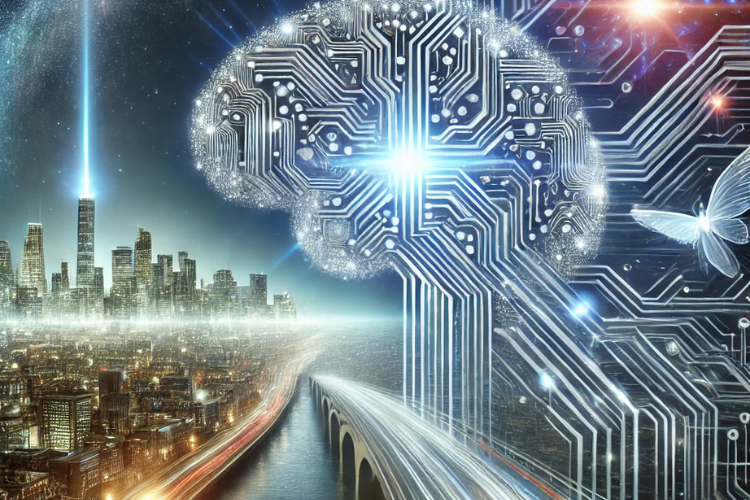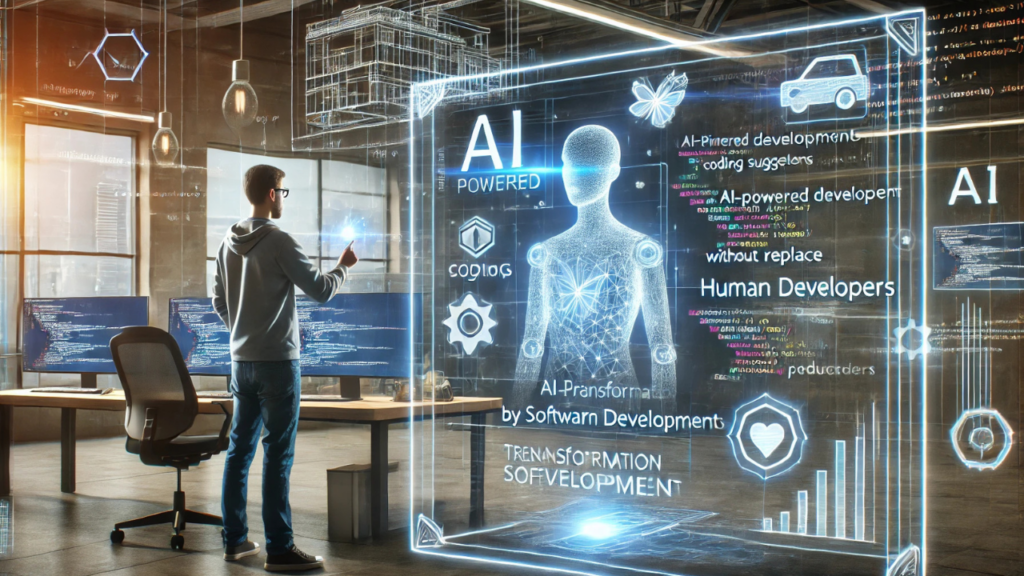Introduction
AI is changing industries, and software development is no exception. However, it is not here to replace developers. Instead, it enhances their skills and efficiency. AI automates repetitive tasks, allowing developers to focus on complex and creative work. It acts as a powerful tool that boosts productivity and improves code quality.
By integrating AI into development processes, teams can build software faster and with fewer errors. Developers who embrace AI will stay ahead in the competitive tech landscape. Let’s explore how AI is transforming software development and what it means for the future of the industry.
1. AI Enhances Productivity and Efficiency
AI reduces the time spent on repetitive coding tasks. Automated code completion tools, like GitHub Copilot and Tabnine, speed up development. These tools suggest entire lines or blocks of code based on context. This minimizes errors and improves workflow.
Developers no longer have to write boilerplate code manually. AI handles repetitive tasks, freeing up time for innovation. With AI, teams can focus on designing scalable and efficient software. The result? Faster development cycles, better products, and a significant reduction in the risk of human errors.
AI-powered automation tools also improve version control and code management. By integrating AI into DevOps pipelines, developers can ensure that code quality remains high while reducing the time spent on manual testing and integration. AI enhances continuous integration and continuous deployment (CI/CD) by detecting code anomalies early and suggesting fixes.
Moreover, AI-driven workflow automation tools like Jenkins and CircleCI help streamline the entire development lifecycle. These tools enable teams to focus on complex problem-solving while reducing administrative burdens. As a result, AI significantly increases overall efficiency and effectiveness in software development teams.
2. AI Improves Code Quality and Debugging
AI-powered debugging tools identify and fix errors faster. Traditional debugging can be time-consuming, but AI automates the process. Tools like DeepCode, Snyk, and Codacy analyze code in real time and provide recommendations.
These tools detect security vulnerabilities, inefficiencies, and compliance issues. They help developers write cleaner and more secure code. AI also predicts potential issues before they become critical, reducing downtime and maintenance efforts.
By leveraging AI, developers can produce high-quality software with fewer bugs. This enhances user experience and builds trust in software products. AI can also automate code reviews, ensuring that best coding practices are followed and potential flaws are detected early in the development cycle.
Machine learning models trained on vast code repositories can identify patterns of common mistakes and suggest improvements. This not only speeds up debugging but also helps junior developers learn from AI’s recommendations. The integration of AI into quality assurance leads to more robust and reliable applications.
3. AI Accelerates Continuous Learning
The tech industry evolves rapidly. Staying updated with the latest trends is essential for developers. AI makes learning easier by offering personalized recommendations. Platforms like GitHub, Stack Overflow, and Coursera use AI to suggest relevant learning resources.
AI-powered chatbots provide instant answers to coding queries. This accelerates problem-solving and skill development. Developers can learn new programming languages and frameworks efficiently.
AI-driven learning platforms track progress and suggest tailored courses. This ensures continuous growth and adaptability in the ever-changing tech landscape. Developers who integrate AI into their learning processes will gain a competitive edge by staying ahead of industry trends and emerging technologies.
Additionally, AI-powered documentation generators, such as OpenAI’s ChatGPT, help developers quickly find relevant information. Instead of sifting through extensive documentation, developers can ask AI-powered tools to provide clear explanations and examples. This improves efficiency and reduces frustration during learning and development.
4. AI Boosts Team Collaboration and Communication
Effective communication is key in software development. AI-powered tools enhance collaboration among developers and project managers. Platforms like Jira, Slack, and Trello use AI to streamline workflows.
AI automates meeting summaries and task management. It tracks project progress and ensures team alignment. Intelligent chatbots assist with real-time queries, reducing delays in development.
By using AI-driven collaboration tools, teams can improve efficiency. This results in faster project completion and better coordination. AI also helps teams manage remote and hybrid work environments by providing seamless communication and workflow automation.
AI-powered documentation tools ensure that team members can easily access and update project documentation. This eliminates misunderstandings and ensures that developers have the latest project details at their fingertips. AI-driven knowledge-sharing platforms allow teams to document solutions and best practices, making it easier to onboard new developers and maintain project continuity.
AI also assists in code collaboration by recommending the best approaches for integrating changes from multiple contributors. Version control systems, enhanced with AI, reduce conflicts and ensure that code merges smoothly. This further improves teamwork and speeds up the development process.
5. AI Unlocks Innovation and Future Possibilities
AI enables developers to explore new possibilities in software development. It helps in automating complex problem-solving and enhances creativity. Developers can use AI to build smarter applications, from chatbots to advanced analytics tools.
AI-driven development frameworks simplify tasks like machine learning integration. Developers can create more intelligent and adaptive software solutions. As AI technology evolves, its impact on software development will only grow.
The key to success is embracing AI as an ally. It allows developers to push boundaries and create groundbreaking innovations. AI is already being used in generative design, where machine learning models suggest new architectural approaches that human developers might not have considered.
Additionally, AI plays a crucial role in cybersecurity by detecting and mitigating threats in real-time. AI-driven threat detection systems analyze network traffic, identify anomalies, and prevent cyber attacks before they happen. This enhances the security of software applications and protects sensitive user data.

As quantum computing and AI converge, developers will have access to unprecedented computing power. This will open new frontiers in areas like drug discovery, climate modeling, and financial forecasting. The future of AI-driven development is limitless, and those who adapt will shape the next generation of software solutions.
Conclusion
AI is revolutionizing software development, but it is not replacing developers. Instead, it is enhancing their skills, improving efficiency, and enabling innovation. Developers who integrate AI into their workflows will stay competitive in the evolving tech industry.
By leveraging AI, developers can build better software faster and with fewer errors. AI-powered learning and collaboration tools ensure continuous growth. The future belongs to those who adapt and innovate.
Startuphakk recommends embracing AI as a tool for growth. Developers who use AI effectively will lead the next wave of technological advancements. Those who harness AI’s potential will gain an edge in software development, ensuring they remain indispensable in an AI-powered world.




